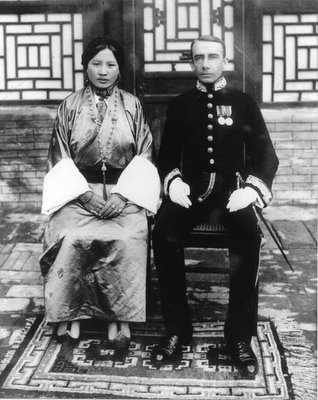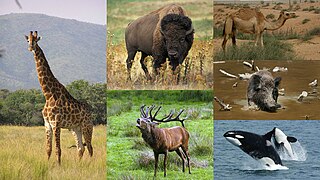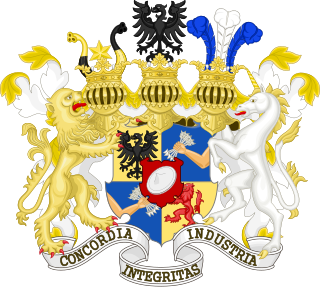
Confucius, born Kong Qiu (孔丘), was a Chinese philosopher of the Spring and Autumn period who is traditionally considered the paragon of Chinese sages. Confucius's teachings and philosophy underpin the East Asian culture and society, and remain influential across China and East Asia to this day. His philosophical teachings, called Confucianism, emphasized personal and governmental morality, correctness of social relationships, justice, kindness, sincerity, and a ruler's responsibilities to lead by virtue.

A language family is a group of languages related through descent from a common ancestral language or parental language, called the proto-language of that family. The term "family" reflects the tree model of language origination in historical linguistics, which makes use of a metaphor comparing languages to people in a biological family tree, or in a subsequent modification, to species in a phylogenetic tree of evolutionary taxonomy. Linguists therefore describe the daughter languages within a language family as being genetically related. The divergence of a proto-language into daughter languages typically occurs through geographical separation, with different regional dialects of the proto-language spoken by different speech communities undergoing different language changes and thus becoming distinct languages from each other.

Marriage, also called matrimony or wedlock, is a culturally and often legally recognised union between people called spouses. It establishes rights and obligations between them, as well as between them and their children, and between them and their in-laws. It is nearly a cultural universal, but the definition of marriage varies between cultures and religions, and over time. Marriage becomes a social construct to adjudicate the conflicts of interest between consenting individuals and a transactional means to fulfill their needs. Typically, it is an institution in which interpersonal relationships, usually sexual, are acknowledged or sanctioned. In some cultures, marriage is recommended or considered to be compulsory before pursuing sexual activity. A marriage ceremony is called a wedding, while a private marriage is sometimes called an elopement.

Shogun, officially Sei-i Taishōgun, was the title of the military dictators of Japan during most of the period spanning from 1185 to 1868. Nominally appointed by the Emperor, shoguns were usually the de facto rulers of the country, although during part of the Kamakura period, shoguns were themselves figureheads, with real power in the hands of the Shikken of the Hōjō clan.

Charles Milles Manson was an American criminal, cult leader and musician who led the Manson Family, a cult based in California, in the late 1960s. Some of the members committed a series of at least nine murders at four locations in July and August 1969. In 1971, Manson was convicted of first-degree murder and conspiracy to commit murder for the deaths of seven people, including the film actress Sharon Tate. The prosecution contended that, while Manson never directly ordered the murders, his ideology constituted an overt act of conspiracy.

The one-child policy was a population planning initiative in China implemented between 1979 and 2015 to curb the country's population growth by restricting many families to a single child. The program had wide-ranging social, cultural, economic, and demographic effects, although the contribution of one-child restrictions to the broader program has been the subject of controversy. Its efficacy in reducing birth rates and defensibility from a human rights perspective have been subjects of controversy.

Artiodactyls are mammals belonging to the order Artiodactyla. Typically, they are ungulates which bear weight equally on two of their five toes: the third and fourth, often in the form of a hoof. The other three toes are either present, absent, vestigial, or pointing posteriorly. By contrast, most perissodactyls bear weight on an odd number of the five toes. Another difference between the two is that many artiodactyls digest plant cellulose in one or more stomach chambers rather than in their intestine as perissodactyls do. The advent of molecular biology, along with new fossil discoveries, found that cetaceans fall within this taxonomic branch, being most closely related to hippopotamuses. Some modern taxonomists thus apply the name Cetartiodactyla to this group, while others opt to include cetaceans within the existing name of Artiodactyla. Some researchers use "even-toed ungulates" to exclude cetaceans and only include terrestrial artiodactyls, making the term paraphyletic in nature.

Joséphine Bonaparte was Empress of the French as the first wife of Emperor Napoleon I from 18 May 1804 until their marriage was annulled on 10 January 1810. As Napoleon's consort, she was also Queen of Italy from 26 May 1805 until the 1810 annulment. She is widely known as Joséphine de Beauharnais.

A surname, family name, or last name is the mostly hereditary portion of one's personal name that indicates one's family. It is typically combined with a given name to form the full name of a person.

The Rothschild family is a wealthy Ashkenazi Jewish noble banking family originally from Frankfurt that rose to prominence with Mayer Amschel Rothschild (1744–1812), a court factor to the German Landgraves of Hesse-Kassel in the Free City of Frankfurt, Holy Roman Empire, who established his banking business in the 1760s. Unlike most previous court factors, Rothschild managed to bequeath his wealth and established an international banking family through his five sons, who established businesses in London, Paris, Frankfurt, Vienna, and Naples. The family was elevated to noble rank in the Holy Roman Empire and the United Kingdom. The family's documented history starts in 16th century Frankfurt; its name is derived from the family house, Rothschild, built by Isaak Elchanan Bacharach in Frankfurt in 1567.

Family Guy is an American animated sitcom created by Seth MacFarlane for the Fox Broadcasting Company. The series premiered on January 31, 1999, following Super Bowl XXXIII, with the rest of the first season airing from April 11, 1999. The show centers around the Griffins, a dysfunctional family consisting of parents Peter and Lois, their children, Meg, Chris, and Stewie, and their anthropomorphic pet dog, Brian. Set in the fictional city of Quahog, Rhode Island, the show exhibits much of its humor in the form of metafictional cutaway gags that often lampoon American culture.

A nuclear family is a family group consisting of parents and their children, typically living in one home residence. It is in contrast to a single-parent family, a larger extended family, or a family with more than two parents. Nuclear families typically center on a married couple which may have any number of children, with the head of the family typically being a patriarchal position. There are differences in definition among observers. Some definitions allow only biological children who are full-blood siblings and consider adopted or half- and step-siblings a part of the immediate family, but others allow for a step-parent and any mix of dependent children, including stepchildren and adopted children. Some sociologists and anthropologists consider the extended family structure to be the most common family structure in most cultures and at most times, rather than the nuclear family.

A given name is the part of a personal name that identifies a person, potentially with a middle name as well, and differentiates that person from the other members of a group who have a common surname. The term given name refers to a name usually bestowed at or close to the time of birth, usually by the parents of the newborn. A Christian name is the first name which is given at baptism, in Christian custom.

A home, or domicile, is a space used as a permanent or semi-permanent residence for one or more human occupants, and sometimes various companion animals. It is a fully- or semi-sheltered space and can have both interior and exterior aspects to it. Homes provide sheltered spaces, for instance rooms, where domestic activity can be performed such as sleeping, preparing food, eating and hygiene as well as providing spaces for work and leisure such as remote working, studying and playing.

The Donner Party, sometimes called the Donner–Reed Party, were a group of American pioneers who migrated to California in a wagon train from the Midwest. Delayed by a multitude of mishaps, they spent the winter of 1846–1847 snowbound in the Sierra Nevada mountain range. Some of the migrants resorted to cannibalism to survive, primarily eating the bodies of those who had succumbed to starvation, sickness or extreme cold, but in one case two Native American guides were deliberately killed for this purpose.

Seth Woodbury MacFarlane is an American actor, animator, writer, producer, director, comedian, and singer. MacFarlane is well known as the creator and star of the television series Family Guy and The Orville (2017-2022), and co-creator of the television series American Dad! and The Cleveland Show (2009–2013). He also wrote, directed, and starred in the films Ted (2012), its sequel Ted 2 (2015), and A Million Ways to Die in the West (2014).

Peter Löwenbräu Griffin Sr. is a fictional character and the protagonist of the American animated sitcom Family Guy. He is voiced by the series' creator, Seth MacFarlane, and first appeared on television, along with the rest of the Griffin family, in the episode "Death Has a Shadow" on January 31, 1999. Peter was created and designed by MacFarlane himself. MacFarlane was asked to pitch a pilot to the Fox Broadcasting Company based on Larry & Steve, a short made by MacFarlane which featured a middle-aged character named Larry and an intellectual dog, Steve. For the series, Larry was renamed Peter.

Family is a group of people related either by consanguinity or affinity. It forms the basis for social order. The purpose of the family is to maintain the well-being of its members and of society. Ideally, families offer predictability, structure, and safety as members mature and learn to participate in the community. Historically, most human societies use family as the primary purpose of attachment, nurturance, and socialization.
Modern Family is an American sitcom television series, created by Christopher Lloyd and Steven Levitan for ABC. It ran for 11 seasons, from September 23, 2009, to April 8, 2020. The show follows the lives of three diverse family set-ups living in suburban Los Angeles, who are interrelated through their patriarch, Jay Pritchett.
Cryptolobata primitiva is a marine species of ctenophores. It is the only species in the monotypic genus.

















